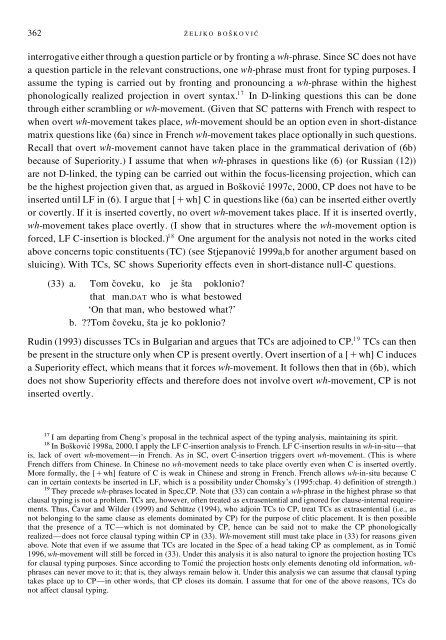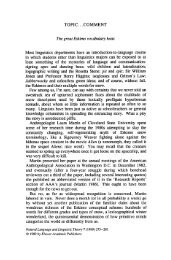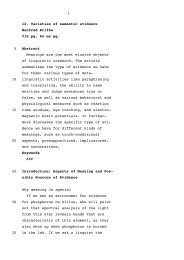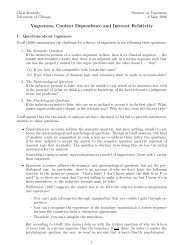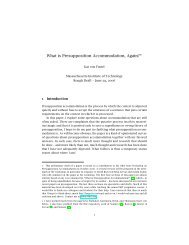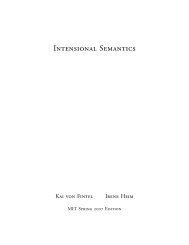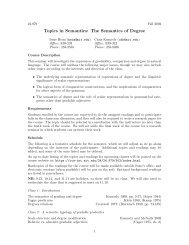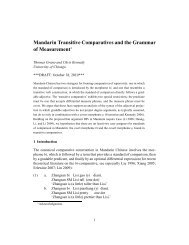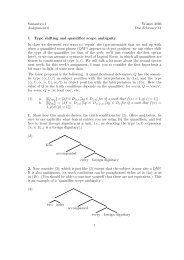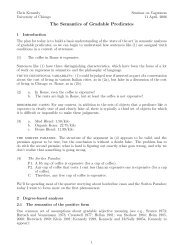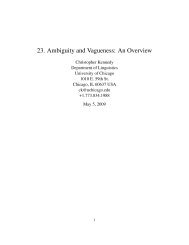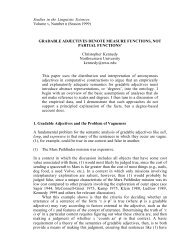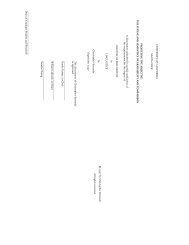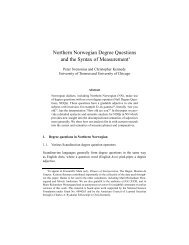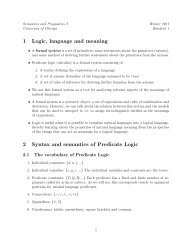On Multiple Wh-Fronting - University of Chicago
On Multiple Wh-Fronting - University of Chicago
On Multiple Wh-Fronting - University of Chicago
Create successful ePaper yourself
Turn your PDF publications into a flip-book with our unique Google optimized e-Paper software.
362 ZÏ E L J K O B O SÏ K O V I Ćinterrogative either through a question particle or by fronting a wh-phrase. Since SC does not havea question particle in the relevant constructions, one wh-phrase must front for typing purposes. Iassume the typing is carried out by fronting and pronouncing a wh-phrase within the highestphonologically realized projection in overt syntax. 1 7 In D-linking questions this can be donethrough either scrambling or wh-movement. (Given that SC patterns with French with respect towhen overt wh-movement takes place, wh-movement should be an option even in short-distancematrix questions like (6a) since in French wh-movement takes place optionally in such questions.Recall that overt wh-movement cannot have taken place in the grammatical derivation <strong>of</strong> (6b)because <strong>of</strong> Superiority.) I assume that when wh-phrases in questions like (6) (or Russian (12))are not D-linked, the typing can be carried out within the focus-licensing projection, which canbe the highest projection given that, as argued in BosÏ ković 1997c, 2000, CP does not have to beinserted until LF in (6). I argue that [`wh] C in questions like (6a) can be inserted either overtlyor covertly. If it is inserted covertly, no overt wh-movement takes place. If it is inserted overtly,wh-movement takes place overtly. (I show that in structures where the wh-movement option isforced, LF C-insertion is blocked.) 1 8 <strong>On</strong>e argument for the analysis not noted in the works citedabove concerns topic constituents (TC) (see Stjepanović 1999a,b for another argument based onsluicing). With TCs, SC shows Superiority effects even in short-distance null-C questions.(33) a. Tom cÏ oveku, ko je sÏ ta poklonio?that man.DAT who is what bestowed‘<strong>On</strong> that man, who bestowed what?’b. ??Tom cÏ oveku, sÏ ta je ko poklonio?Rudin (1993) discusses TCs in Bulgarian and argues that TCs are adjoined to CP. 1 9 TCs can thenbe present in the structure only when CP is present overtly. Overt insertion <strong>of</strong> a [`wh] C inducesa Superiority effect, which means that it forces wh-movement. It follows then that in (6b), whichdoes not show Superiority effects and therefore does not involve overt wh-movement, CP is notinserted overtly.17 I am departing from Cheng’s proposal in the technical aspect <strong>of</strong> the typing analysis, maintaining its spirit.18 In BosÏ ković 1998a, 2000, I apply the LF C-insertion analysis to French. LF C-insertion results in wh-in-situ—thatis, lack <strong>of</strong> overt wh-movement—in French. As in SC, overt C-insertion triggers overt wh-movement. (This is whereFrench differs from Chinese. In Chinese no wh-movement needs to take place overtly even when C is inserted overtly.More formally, the [`wh] feature <strong>of</strong> C is weak in Chinese and strong in French. French allows wh-in-situ because Ccan in certain contexts be inserted in LF, which is a possibility under Chomsky’s (1995:chap. 4) definition <strong>of</strong> strength.)19 They precede wh-phrases located in Spec,CP. Note that (33) can contain a wh-phrase in the highest phrase so thatclausal typing is not a problem. TCs are, however, <strong>of</strong>ten treated as extrasentential and ignored for clause-internal requirements.Thus, Ćavar and Wilder (1999) and Schütze (1994), who adjoin TCs to CP, treat TCs as extrasentential (i.e., asnot belonging to the same clause as elements dominated by CP) for the purpose <strong>of</strong> clitic placement. It is then possiblethat the presence <strong>of</strong> a TC—which is not dominated by CP, hence can be said not to make the CP phonologicallyrealized—does not force clausal typing within CP in (33). <strong>Wh</strong>-movement still must take place in (33) for reasons givenabove. Note that even if we assume that TCs are located in the Spec <strong>of</strong> a head taking CP as complement, as in Tomić1996, wh-movement will still be forced in (33). Under this analysis it is also natural to ignore the projection hosting TCsfor clausal typing purposes. Since according to Tomić the projection hosts only elements denoting old information, whphrasescan never move to it; that is, they always remain below it. Under this analysis we can assume that clausal typingtakes place up to CP—in other words, that CP closes its domain. I assume that for one <strong>of</strong> the above reasons, TCs donot affect clausal typing.


